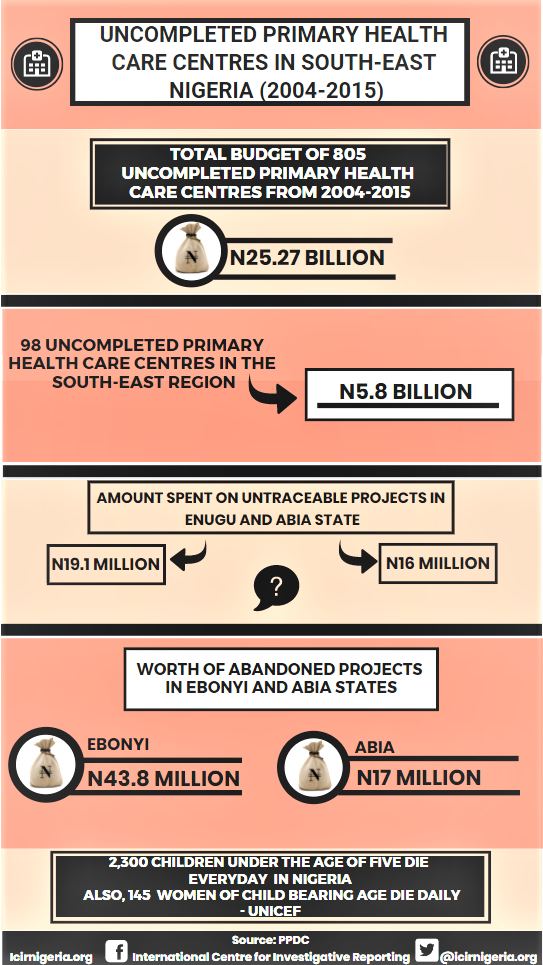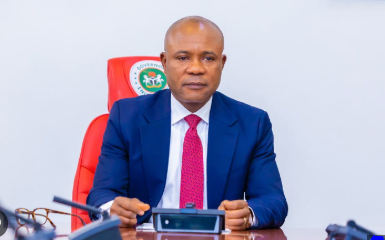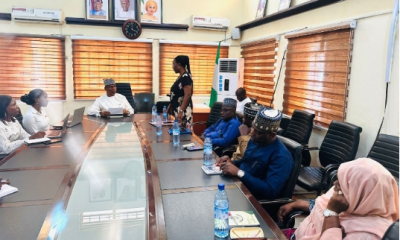Features
INVESTIGATION: Ghost health centres, abandoned contracts, dilapidated buildings
Published
8 years agoon
By
Olu Emmanuel
- Why Nigerian health indices are worrisome
In the middle of July 2017, the Federal Government announced plans to revamp 10,000 primary healthcare centres across the country to ensure and provide quality health service delivery, particularly to rural dwellers. Three months hence, YEKEEN AKINWALE embarks on a fact finding tour of some contracts awarded for primary healthcare centres in four South east states of Enugu, Imo, Ebonyi and Abia states. His findings underscore a neglected primary health care sector.
‘Oga, na here you go come down,’ the driver announces in Pidgin English. After about 20 minutes’ drive from Obollo Afor, he pulls over his rickety bus to the side of the road for this passenger (Journalist) to disembark. Almost immediately, he zooms off and the smoke from his bus soon settles and the search continues – the search for Obollo Ile community.
Where are Obollo Ile and Ofiambela… invisible villages, home of ‘ghost projects’?
After asking from almost ten different people at Obollo Afor, the headquarters of Udenu Local Government about the location of Obollo Ile, there is no clue to the location as everyone claims there are only Obollo Eke and Obollo Etiti communities in the local government but the record says Obollo Ile.
“Oga, na Obollo Eke you dey go,” says the driver who convinces his passenger to board his bus from Obollo Afor market. “We no get anywhere wey be Obollo Ile here, na Obollo Eke and I go carry you reach there”, he adds as he jumps into the driver seat to start off the engine.
So all of them insist the place is Obollo Eke village. Therefore, the journey in a bus returning from the market to the village is inevitable.
All signposts by the road side say Obollo Eke; could it be a typographical error in the record that says Obollo Ile? It may be so. But the village is not the subject of the ultimate search but an uncompleted primary health care facility awarded in 2005 by the Federal Government. And according to information made available by the National Primary Health Care Development Agency (NPHCDA), the project is located at Obollo Ile, Udenu Local Government, Enugu State.
After another 20 minutes’ trek from the main road through erosion ravaged road that leads to Obollo Eke Market Square; there stands in the bush with a sign post reading, “Early Child Bed Clinic”, an old healthcare center with pre-independence buildings which look recently painted but almost taken over by weeds.
No water, no light…the sorry state of the oldest health center in Udenu Local Government Area
“This clinic was built before independence”, says a very courteous Ogbonna Bibiana, the officer in charge of the clinic, as she responds to whether it is the one awarded by the Federal Government in 2005. “And this place is Obollo Eke not Obollo Ile; in fact, there is no village that is like that here,” she quips, leading her guest to one of the empty hospital wards with few beds.
Bibiana could not have been wrong; there is nothing at the health center to suggest it was constructed about 12 years ago. The facility does not have the look of a model primary health care center. It has no source of water- “We rely on rain and stream water here because we don’t have well or a borehole,” she says, and there is no electricity as kerosene lantern and torch light are what they use at night even if there are women in labour to attend to.
What looks like a toilet project in the premises of the clinic is an abandoned dug ground which is said to have been undertaken by UNICEF.
“UNICEF said they are constructing toilets and providing water. They just dug and left more than a month ago.”
In a community with high number of local birth attendants, the clinic is not a choice for many pregnant women despite the risks involved. But there is no doctor at the government health care facility, the real reason most men in the village discourage their pregnant wives from delivering there.
“Pregnant women don’t even patronize the center because of lack of facilities and manpower. We have no doctor but we are only Community Extension Workers,” says Bibiana who is a Principal Health Extension Worker.
Showing apparent neglect by the local authority, the Early Child Clinic itself is a source of diseases with two filled pit latrines oozing out offensive odour. “We don’t have placenta pit, the latrines also serve as placenta pits,” she reveals. How do Bibiana, her family and patients defecate? “We make use of the bush,” she says.
And just behind the hospital building, lie disposed used syringes and needles and other wastes from the center in a small carton.
The beds are broken down, covered by dust as the compound is taken over by cassava and maize farm owned by Bibiana’s family.
Despite all these, some villagers still patronize the healthcare centre, with reservations. Mamah Everestus, a community leader who brings his daughter for malaria treatment that morning laments the condition of the center. “Government is supposed to fund the health centre well; no water, no generator, no toilet, no placenta pit, no drugs,” he fumes.
“They are supposed to see what the people in the community are suffering and all of them are eating in Abuja. Look at grasses in a health centre, no worker to cut the grasses,” he adds.
But where is Obollo Ile? She suggests it might be the new health center at Obollo Ishielu or a village they called Amutenyi. “It may be at Amutenyi because that is where they have a new health center”.
A ride on a bike from Obollo Eke market square to Obollo Ishielu revealed another health center though newly built but under lock and key; even as early as 10am. It was constructed in 2015 under Millennium Development Goals (MDGs) projects. There was no one around. Residents including Bibiana claim that the center was giving out drugs free to the villagers when it was opened newly and part of the reasons pregnant women chose it over Early Childhood Clinic. It however does not open until 10am.
The search for Obollo Ile where the Federal Government has awarded N19million to Abduck Nigeria Limited as the contractor returns to the Udenu Local Government Secretariat at Obollo Afor.
With Ekwueme Silas, Head of Department of Health away in Enugu attending a workshop, no one is willing to speak. They claim they have no permission to talk. Those who volunteer to speak though pleaded for anonymity say there is no village as Obollo Ile.
But when he speaks through telephone conversation, he says there might be a mistake in the spelling of the name of the community. Though he says there have been rumours about an abandoned healthcare project in the local government. ”…people used to say there is an abandoned project somewhere,” he says. But he has not come across such a project since 2016 when he assumed office.
His words: “I have not been able to understand the particular community…Obollo and then gini? Yes, there is Obollo Eke, Obollo Etiti and Obollo Ishielu, probably because you may have gotten the name wrong but we have Obollo-Oye. It’s like Obollo-Oye you want to call.”
When he was told that what is in the record of NPHCDA is Obollo-Ile, Silas replies, “there is no place like that.”
Could it be the federal government awarded N19million ghost project? So it seems.
Udenu Local Government in Enugu State is not the only place where a funded Model Primary Healthcare project is untraceable. Elsewhere in Ukwa West Local Government, Abia State, another N16million Model Primary Health Care project awarded in 2004 to Emjec Nigeria Limited could also not be found.
According to a record of uncompleted primary healthcare centres across the country obtained by Public and Private Development Centre (PPDC) from NPHCDA, location of the project is Ofiambela in Ukwa East Local Government, Abia State.
After more than two hours search through Obeaku Village, to Ohambelle (the supposed Ofiambella) and back to Ukwa West Local Government secretariat, there is nowhere known as Ofiambella; just as there is no uncompleted model primary healthcare centre in the village. Did federal government award a ghost project in a ghost community?
An existing Health Centre on the main road of Ohambelle constructed by Adolphus Wabara, a former senate president, during his second tenure as the local government chairman of Ukwa West in 1998, is in itself begging for repair.
“We don’t have a federal government constructed primary healthcare here in Ohambelle,”says Florence Ekeke, who works at Ohambelle Health Centre.
Ngozi Emeka, Head of Health Department at the local government secretariat confirms the non-existence of such project. According to her, “We have 33 healthcare centres in this local government but we don’t have any project in Ohambelle that is under construction or uncompleted. Even the one in that community is dilapidated. I’m two months old here but to the best of knowledge, there is none like what you are looking for, “she tells the journalist.
Like Obollo-Ile, Ofiambella from all indications appears to be a ghost village with a ghost primary health care project.
Expired drugs, leaking roofs…the dilapidated Amaboku Health Centre
Despite a fairly large turnout of nursing mothers and pregnant women as well as elderly citizens at the health centre that Wednesday morning, Okpe Martina, principal community health extension worker who heads Amaboku Healthcare Centre, Igbo Etiti Local Government in Enugu State, says it is hard to give up on attending to the health needs of the people of the village but the tools to work with are decaying.
The entire community, Ozor Raphael, a retired school teacher, also says would be seen to have failed if the health centre is closed down despite its precarious situation.
It has 14 bed spaces though all covered by dust. Amaboku Health Centre, awarded in 2004 at the cost of N16, 540, 331, 49 has fallen in standard both in terms of infrastructure and personnel. Showing apparent signs of neglect by the relevant authorities, the health centre is an example of failure of government to treat primary healthcare as the cornerstone of a stronger and resilient public health system.
The laboratory at the center does not work because of lack of manpower to manage it; a doctor comes from Nsukka twice a week to the center and comes if there is an emergency.
There ought to be resident doctors at the clinic – what could make a doctor to reside- a residential apartment constructed for that purpose in 2013 under MDGs project- is uncompleted. Four years after, the building remains without windows and doors – an example of disconnect between government’s policy making and implementation.
With its ceilings falling, leaking roofs, expired drugs, power outage, Amaboku Primary Healthcare Centre needs revitalization. Disconnected by the electricity distribution company for the past eight years, the local authorities could not raise N30, 000 said to be the debt for the centre to be reconnected.
“If we have money, we buy fuel to power the generator, but if we don’t have we use lantern at night,” she reveals.
Despite an application to the local government authority by Martina in May 2017 requesting for renovation of the only public health institution in the village, nothing has happened and the facility is flooded each time it rains as a result of leaking roofs. The room that serves as drug store is not spared of deluge of water from the leaking roof when it rains.
“We need help for this place, you are seeing water because it is raining season. Once it is dry season, we don’t have water, we buy water to flush toilets or go into the bush,” says Martina as she shows dilapidated structures at the centre.
The local government health secretary could not be reached; she was also in Enugu attending a week long workshop.
Covered by the dust are drugs that have already expired…their manufacture and expiry dates read 2005 to 2008. Next to drug shelves is a microscope whose lens are not functional. She says the drugs were expired right from when they were supplied just as the microscope has never worked since it was delivered to the centre.
Why are the drugs still being kept on the shelves? Martina discloses that it is only personnel of National Agency for Foods, Drugs, Administration and Control (NAFDAC), that can come and remove the drugs and dispose them.
Evidently, the Federal Government through the NPHCDA does not follow through many of the contracts awarded for the construction of the healthcare centres.
The solar panel installed to provide alternative energy for the center since its commission has never worked. It was abandoned in a corner under the cover of darkness and taken over by dust and cobwebs.
The same goes for the water reservoir which workers at the facility claim was not well constructed, thus leaking and could not hold water. Toilets are filled with unflushed defecations. Workers and visitors at the centre rush into the bush when nature calls. The hospital windows are without mosquito nets.
This is despites the first global healthcare ranking report which placed Nigeria at 140th position with 51 points on Healthcare Access and Quality Index. The ranking is based on a quantification of personal access and quality for 195 countries and territories from 1990 to 2015.
According to the study published in the May 18, 2017 edition of the medical journal, the Lancet, Nigeria lagged far behind other leading African nations in a new global healthcare report. Nigeria couldn’t have fared better with all these indices.
The United Nations Children Fund (UNICEF) says; “Every single day, Nigeria loses about 2,300 under-five year olds and 145 women of childbearing age. This makes the country the second largest contributor to the under–five and maternal mortality rate in the world”. With a health centre like Amaboku child and maternal mortality would no doubt be on the rise in the country.
Abandoned projects…people’s frustration
The people of Etitioma Nkporo, in Ohafia Local Government, Abia State, are still looking for when mother luck will smile on them so that they enjoy the real dividends of democracy. They are yet to feel the real presence of both the federal and state governments – there are no good roads to the community and there are no good health care facilities.
Despite being the community of Ude Oko Chukwu, the current deputy governor of the state, Etitioma Nkporo, the largest of the eight communities in the locality has been struggling to have an abandoned primary health care centre completed more than ten years ago. They are still hoping for an intervention from the federal government, after the contractor, Masta Services Nigeria Limited, abandoned the project.
Awarded at the cost of N17million by the federal government to Masta Services Limited in 2004 when 120 of such were approved for construction nationwide, what is supposed to be a model primary health centre at the village is now home to lunatics, hemp smokers and urchins who have also turned it to their toilet.
Sitting on an expansive plot of land, and looking down at the palatial house of the Deputy Governor, the building is only roofed, no windows and doors.
“For over ten years that project has been abandoned … and that has taken us back. We have lost the use of drugs. We have over a million naira worth of drugs sent to the community. Parts of the equipment are spoilt already,” Says Egwugwo of Amudu, Eze Innocent Ume
“We don’t have road, we have worried the federal government to give us just a road. Our people say two legs are not good to be bad, but now we have five legs, none is good. We have five outlets leading outside, none is good. If somebody is sick before you carry him to Ohafia, at times you take Ikem to Igbere before you go to Ohafia. The other health center does not have anything; no doctor, no laboratory. There is nothing there and we have been reporting to the local government authority,” he adds.
Has the community folded its arms over the abandoned projects and the health needs of the people? The monarch says the community development union has met with Mau Ohuabunwa, senator representing Abia North Senatorial District in the Senate on the fate of the facility.
He says, “About two weeks ago, our people, led by the chairman of Nkporo Development Union, NDU, went to Mau to ask about the project. He told them that about N50million has been approved for the completion. He told the chairman of Nkporo Development Union that the sum of N50million has been approved”. Ohuabunwa is also member of Senate Committee on Primary Health Care and Communicable Diseases.
The Monarch confirms that the lawmaker sponsored the project when he was a member of the House Representatives between 1999 and 2007. Does he know the contractor handling the project? Eze Ume replies, “I don’t know the contractor.”
Further findings by ICIR, however show that Masta Services Limited, the company handling the abandoned project, was registered with the Corporate Affairs Commission (CAC) in 1992 and has one Ugo Ohuabunwa as its managing director and chief executive officer. If Ugo Ohuabunwa is a relation of the senator, it is a clear violation of the 2007 Procurement Act.
However, the lawmaker was not available for comments. Calls put to his constituency telephone number were not answered, just as messages sent to the same number were not replied.
Elsewhere in Okposi Umuoghara, Ezza North Local Government, Ebonyi State, it is a tale of lamentation for parents who after taking their sick children to the only healthcare centre in the area but could not get them treated.
It is known as Comprehensive Health Centre, but nothing is as depleted as the facility.
By 9am, no one is at the center; as soon as a lady steps down from a motorbike and unlocks the main entrance that leads into what appears like a town hall, parents with their kids rush in after her in droves. And by 9:29 am when a fat woman who would later turn out to be the officer in charge of the centre climbs down from another bike, there are more than ten children in the hall waiting to be treated.
On a day seven children test positive to malaria, their fate hangs in the balance as there is no drug to treat them except injection which, according to Peace Ohike, the officer in charge of the centre is the last resort.
Okoposi is ravaged by malaria- the centre records on a daily basis more than 40 cases. Yet there are no drugs to treat them.
Nwane Virgilus, a father of four was at the former development center now designated Pilot Model Health Centre by the State government with two of his children; they were down with malaria. Victory Nwane, three years old, and Shedrach Nwane, five years old, looked pale and weak. Both, like Nweze Kosarachi, six years old and Nweze Ifesinachi, five years old, rested on the wooden benches at the centre.
“Malaria is reigning here. We don’t use to have negative. It is a major challenge here. Many people burnt their mosquito nets when they were given during the tenure of Elechi Martins as the governor thinking it was a political gift. Now we don’t have enough nets,” Ohike says as she tries to take blood sample of a sick kid.
When women go into labour at night, lantern and torch lights come to the rescue as the centre was long disconnected from the power source due to undisclosed debt. The labour room that has no light is also where women who come for family planning insertion are also attended to.
But while parents and their wards struggle to get healthcare at the former development centre, now pilot primary centre in Okposi Umuoghara, the N21.9million National Primary Healthcare Centre which ought to bring relief to the people of the area wastes away under lock and key near Nwuomah Primary School.
It was awarded in 2014 and handled by Stephanie Michael Nigeria Limited. Over taken by weeds, the well painted and fenced facility looked completed and ready for use. But the reason why it has remained locked is not known. The contractor, Stephanie Michael Nigeria Limited could not be reached – its particulars could not be found with the CAC.
In a clear case of disconnect between politicians and their constituents, residents of Okposi Umuoghara did not know that the facility is meant to serve them.
Even where the abandoned healthcare centre is located, nobody knew it is meant to serve them. The construction signpost that supposed to provide information about it was on the ground, taken over by weeds while termites feed on it.
Victoria Chinedu, a pregnant housewife whose house is adjacent the facility, does not know what the building is meant for. But for her antenatal care, she takes N50 Keke NAPEP ride to the Development Centre. “We go to the Development Centre for ante-natal and immunization,” she said.
A disappointed Virgilus said that many people in the community thought that the abandoned primary healthcare centre was a political project, sponsored by Peter Edeh, a former member of House Representatives representing Ezza North and Ishielu Federal Constituency. Yes, it is actually a constituency project. However, since he lost his re-election bid, the project seems to have suffered neglect.
“We don’t know that place is a primary health centre. We only know that Honourable Peter is the one behind it,” he said.
Like Okposi, like Nkalaha
At Nkalaha, Ishielu Local Government, Ebonyi, nursing mothers such as Ada Ugochukwu prefer to take their babies or themselves to Amofun community in Enugu State. Holding her sick son to her chest and trying to maneuver her way round the bad road, Ugochukwu says she is taking her son to Amofun for treatment because the health centre at Nkaleha has no doctor or qualified nurse.
They have enough reasons. From Gedegede village to Nkaleha, it is easy for a horse to pass the eye of a needle than for human beings to move on the road to the village. It is deplorable. Then, a newly constructed model primary health care is also under lock and key. It has been taken over by bushes.
The only existing primary health care centre serving the whole community exists just in name. It has no doctor, it relies on stream water for treatment of patients. Pregnant women in the village make use of birth attendants when in labour rather than the centre even if they had attended ante-natal there.
Ebe Rosemary, who heads the centre, says there is no visiting or resident doctor at the centre. The shelves are filled with expired drugs.
Speaking on why the centre has not been opened for public use, the contractor, Status Global Services Limited who handled the N21.9million project awarded in 2014, says he uses his personal money to undertake the project.
His words: “Most of the projects are constituency projects. Most of them are not backed by cash and that is what led to the collapse of a job. Why this one is done is because I used my personal money and I’m using my contacts to recover my money. The project was awarded in 2014 but the letter of award was collected almost about May 2015 and it was entering 2016 before we finished the signing of relevant documents and we finished the whole job by 2016”.
Nothing model in Orogwe Model Primary Healthcare Centre
Despite her old age and a threatening high blood pressure, she manages to cross the water -logged roads to the health centre. Madam Abigail has high hopes that her rising blood pressure would be lowered once she gets to Orogwe Primary Health Care Center in Owerri West Local Government of Imo State. She comes to the centre on a regular basis for check-up.
But the 80 year-old mother of four would later be disappointed- indeed she sits with dejection in a white plastic chair as Onogbo Augustina an environmental health officer in charge of the center breaks the news to her.
The equipment to measure her blood pressure, sphygmomanometer, had broken down since the previous night. She could not be attended to.
Revealing her total grey hair after removing her headscarf, Madam Abigail as she is addressed by people in the community speaks in Igbo of her frustrations about the clinic. Facing this journalist, she says, “Please tell them (the Federal Government) that there are old people here. They should bring plenty medicine”.
Her fate at the clinic is a daily occurrence which so many other residents patronizing the health care facility have had to endure due to apparent lack of facilities and tools to work with by the health workers.
But that is not the only thing that is not working at the centre. Everything about it is not right.
Orogwe Primary Health Care Center was among the 120 primary health care centres awarded in 2004 by the federal government for construction as part of measures to address the health care needs of Nigerians at the grassroots.
But 13 years after, the centre remains an uncompleted facility. Awarded for construction at the sum of N16millon to an unregistered company, Crossland, it was not occupied until 2015 when authorities at Owerri West Local Government closed down what was known as the temporary health centre. It was later converted to a Customary Court.
“We were using the temporary site before we moved here. In 2015, we were told that government wanted to use the place, so they pushed us to this permanent site but nothing is working here” said Augustina as she conducts ICIR reporter around the facility.
They were forced to occupy the new health care centre despite not having doors, electricity, water and other essential facilities. Visitors are welcome to the centre by broken floors devoid of tiles, non-functioning electrical installations, and an unsecured facility as there is no security attached to the centre.
According to her, “there is no water at the centre; there is no electricity, the generator is faulty and the plumbing system is not good. The injection room has no light, dispensary room has no light and we use candle and lantern at night to deliver women who are in labour.”
Findings revealed that all the electrical installations have not functioned since 2015 when the centre became operational because the project was never completed.
The security house which is just by the main gate to the centre has neither door nor window. By the contract details and specifications, the centre ought to have doors, windows while the floor is also expected to be in tiles. All these were conspicuously missing. The mattresses are without cover or bed spread.
“Only the labour room and the adjoining room have tiles and were done by the community. None of the wards and other rooms has doors,” Augustina reveals.
There are only ten workers at the center; community health extension workers headed by a Principal Extension Health Worker. The workers’ morale is dead. They are owed salaries by the local government. In 2015, they were owed eight months salaries.
This is however not an isolated case- the situation is not different elsewhere in Omuma, Oru East Local Government, Imo State where rainfall is the main source of water at the health care centre. Pipes are channeled from the roofs to storage tank to get water for the health centre’s use. The motorised borehole is not functioning. Pregnant women and nursing mothers who the facility is meant to serve don’t usually patronise it.
ICIR gathered that pregnant women who attend the health centre for ante-natal prefer to deliver elsewhere for security reason.
“This place is not secured, and that is why when they go into labour at night, they go elsewhere” says Ugoeze Ebighi Euharia who heads the centre.
The center, has not been lighted since it was opened, ICIR gathered. “For more than four years, there has been no light here. In fact since this place was opened there has never been a light”
Like the Orogwe Health Centre, Omuma’s electricity bulbs and ceiling fans are also mere cosmetics; they have never worked.
The outpatients ward floor and those of toilets were also not tiled. The generating set meant to power the 12-bed health centre is also not working. It has unoccupied quarters for nurses and doctors, but Eucharia said the size of the quarters could not accommodate married health workers who according to her ought to be residents at the Centre.
“As you can see, we don’t have security, we don’t have accommodation here. If we have accommodation, people will be trooping here,” she said
But despite Orogwe and Omuma having no required facilities to function well, they still serve the people of the community.
Government not unaware of abandoned projects nationwide
Federal Government is notorious for awarding contracts without cash backing or what is known in legislative parlance as budgetary allocations. From 1998 till date, there is a plethora of projects nationwide that have been abandoned or out-rightly forgotten by the government due simply to lack of budgetary allocation.
The health sector is not an exemption. Disregard for due process in contract award, violation of the 2007 Procurement Act as well as misdemeanor by contractors are reasons contracts for health care centers are either untraceable, abandoned or done haphazardly.
A Freedom of Information (FOI) request to the Executive Director of NPHCDA on the status of the contracts and procurement details was not responded to before the end of statutory seven days. However, an official of the agency said government is not unaware of many abandoned projects across the country.
The top official who does not want to be mentioned explains that failure of government to back up many contracts awarded with budget is one of the reasons such projects are abandoned. He revealed that not less than 1001 projects had been abandoned by the federal government across sectors.
“A lot of NGOs are working with the National Assembly to amend appropriation in such a way that projects that you have awarded for instance, in 2016 and are not completed, how do you include them in 2017 budget?
“If you don’t include them in 2017 budget, how do you get them completed? Those you awarded in 2017 now, may be the federal government is just releasing fresh capital allocation now. This is what accounts for most of the abandoned projects nationwide,” he adds, noting that the inability of government to release funds for project during the fiscal year keeps most of the projects aground.
Sampson Parker, a former commissioner of health in Rivers State, shares the same view on this. According to him, government awards contract without following through. “Government needs to appoint management committee at the local government level to oversee these projects. People award contracts here in Abuja without following through. If there is a policy and we follow through with proper funding, there won’t be the problem of abandoning of projects.”
He laments that award of contracts has been politicized by political office holders, who he says site contracts in their localities without political will to execute it. “Placement of projects has been politicized. Before they were criticizing it and later it became a political thing that if you don’t have it in your area, you are not a big man.”
But, Parker adds that the governments at the three tiers need political will and political leadership to bring the nation’s health sector out of the woods, because according to him, “Nigeria’s health indices are worrisome and among the worst in the world.
This investigation is supported by the John D. and Catherine T. MacArthur Foundation and the International Centre for Investigative Reporting
You may like


FEC approves N987 billion for major airport upgrades nationwide


Army court martial sentenced soldier to death, Another to 10 Years imprisonment


NUJ Enugu honors Governor Peter Mbah with icon of democracy award


COAS Oluyede urges media to prioritize responsible reporting on Nigerian army activities


Ebonyi NUJ correspondents’ chapel partners with police to combat crime


NPC collaborates with AIG-Imokhuede foundation to boost public sector efficiency
Trending

 Health6 days ago
Health6 days agoDeclassified CIA memo explored concealing mind-control drugs in vaccines

 Entertainment1 week ago
Entertainment1 week agoSimi addresses resurfaced 2012 tweets amid online backlash

 Crime6 days ago
Crime6 days agoSenior police officers faces retirement after Disu’s appointment as acting IGP

 Education1 week ago
Education1 week agoPeter Obi urges JAMB to address registration challenges ahead of exams

 Health1 week ago
Health1 week agoNAFDAC issues alert on suspected revalidated SMA Gold infant formula

 Comments and Issues7 days ago
Comments and Issues7 days ago20 Critical Fixes to Save Nigeria’s Democracy from Electoral Fraud

 Football1 week ago
Football1 week agoMartínez ruled out of Everton clash with calf injury

 Latest6 days ago
Latest6 days agoICPC yet to respond to El-Rufai’s bail request as arraignment date looms

